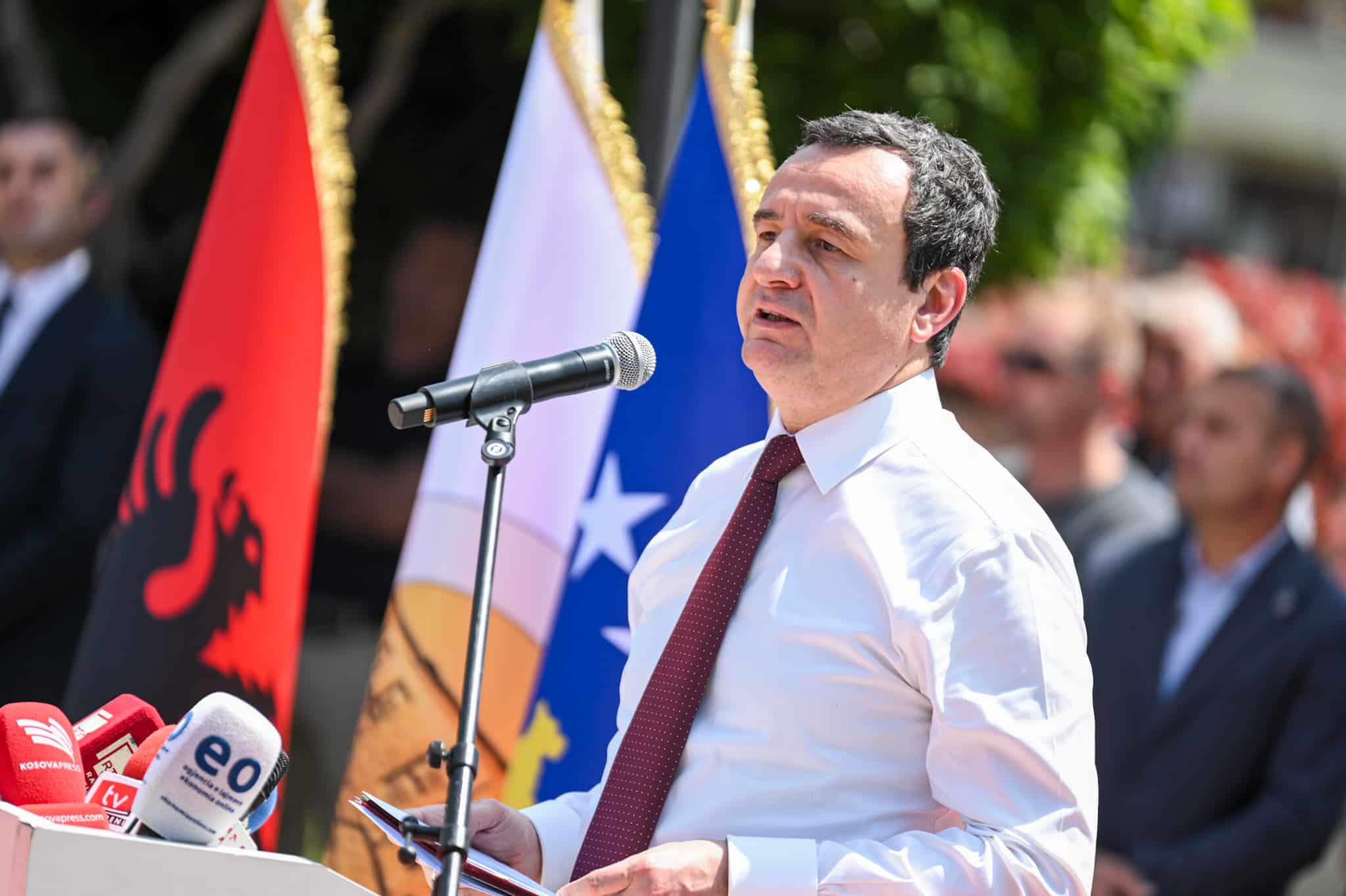Prizren, June 10, 2025
Honorable Mr. Bajram Begaj, President of the Republic of Albania, and First Lady Armanda Begaj,
Honorable Mayor of Prizren, Mr. Shaqir Totaj,
Honorable Mr. Hajrulla Çeku, Minister of Culture, Youth, and Sports,
Esteemed Members of the Assembly of the Republic,
Respected Mayors of municipalities in Kosovo, as well as from the Presheva Valley and North Macedonia,
Honored attendees,
Ladies and Gentlemen,
Brothers and Sisters,
These days, as we mark 26 years since the liberation of Kosovo—this quarter-century of the greatest and highest-quality freedom our country has ever known—this period has also been characterized as one during which we have remembered the League of Prizren most consistently and continuously.
Year after year, on every anniversary, every June 10th, this very place where we are gathered today has brought us together to commemorate the League and to be revitalized through its legacy.
We have never changed the motto of this annual event, which proclaims: The League is alive. But why is it so important to preserve and cultivate the memory of the League of Prizren? Why is it so crucial in our reflection to say that the League is alive?
Let me offer a few reasons—not as their author, but as their supporter. The authorship is found throughout the years, in the multifaceted resistance of our people and in the achievements of statehood by the half of our nation that remained outside at the beginning of the last century.
The Albanian League organization, headquartered in Prizren, represents the highest point of the Albanian National Awakening Movement. It is the National Awakening in political action.
The Albanian League, which was founded here in Prizren, in the Bajrak Mosque on June 10, 1878, serves as a kind of nexus where all the key issues and central themes of modern Albanian history converge—both in the internal Albanian context and in the global societal condition of that time.
We say this based on the fact that the Albanian League was established as a political organization that would articulate the political will of all Albanians in response to the decisions of the Congress—namely, the Treaty of Berlin. The League gave voice to the political thought of Sami Frashëri and Pashko Vasa, two widely recognized names even within the Ottoman public sphere.
For the first time in several historical centuries, the League was forging a new direction: the idea of unity in vision, representation, and effort among Albanians.
It was uniting, around a single national political project—transcending religious, regional, and tribal differences—the maximum number of Albanians across all four vilayets inhabited by an Albanian majority.
The goal was a self-governing Albanian vilayet as a unified administrative unit within the region of Rumelia, as the European territories of the Ottoman Empire were then called.
The League provided Albanians with a clear political position aligned with the now broadly accepted European premise that every true nation should have a state of its own.
In the external context, the League represented full awareness of the nature of the chauvinistic political projects of neighboring countries, as well as of the era emerging through the shifting composition of the Great Powers. Therefore, in the Albanian League of Prizren, we also find the authenticity of Albanian political thinking that was both cohesive and state-building, as well as the forum where pro-Ottoman and autonomist political factions clashed.
In the Albanian League of Prizren, we also find the spirit of rebellion expressed through petitions and protests, as well as the militant and military voluntarism for the defense of Albanian territories from neighboring armies.
In the League of Prizren, we also find the ability and capacity of Albanians to self-govern and to exercise self-determination, as well as their political capacity to take positions on the international political developments of the time—such as the Russo-Ottoman wars and the competing interests of the Great Powers, from Britain, France, and Germany to Austro-Hungary and Italy.
Ultimately, with the League of Prizren, Albanians expressed themselves uniquely—about who they were and what the international political reality was. Despite the suppression of the League of Prizren as an organization, it has remained alive as an example of resolve and mission in the history of the Albanian people’s struggle to realize their legitimate political will, as an affirmative and peace-oriented project.
The League and the thinkers of the National Awakening made it clear: a peaceful and promising Balkans is a Balkans where Albanians are respected in their language, their numbers, and their territory.
They asked only for what was rightfully theirs, and they sought independence not to dominate others, but to be equal to others.
Had the political idea of the League of Prizren been more attentively heard by the Great Powers—rather than their short-term interests—surely the Balkans, our region, would not have remained for so long a metaphor for a “powder keg.” This is why the League is alive in the mind of every Albanian who respects themselves—as the most political public expression of the nation—and among others who share the same universal values.
Let us remember, every time we mention the League—and the Awakening—this great movement of thought and language, comprised of people of high knowledge and distinction, who were more determined than ever before in the face of an ambiguous national past and a complicated international horizon.
Therefore, monumental respect is due to all those people who envisioned and founded the League in the beautiful city of Prizren.
Thank you all very much!


